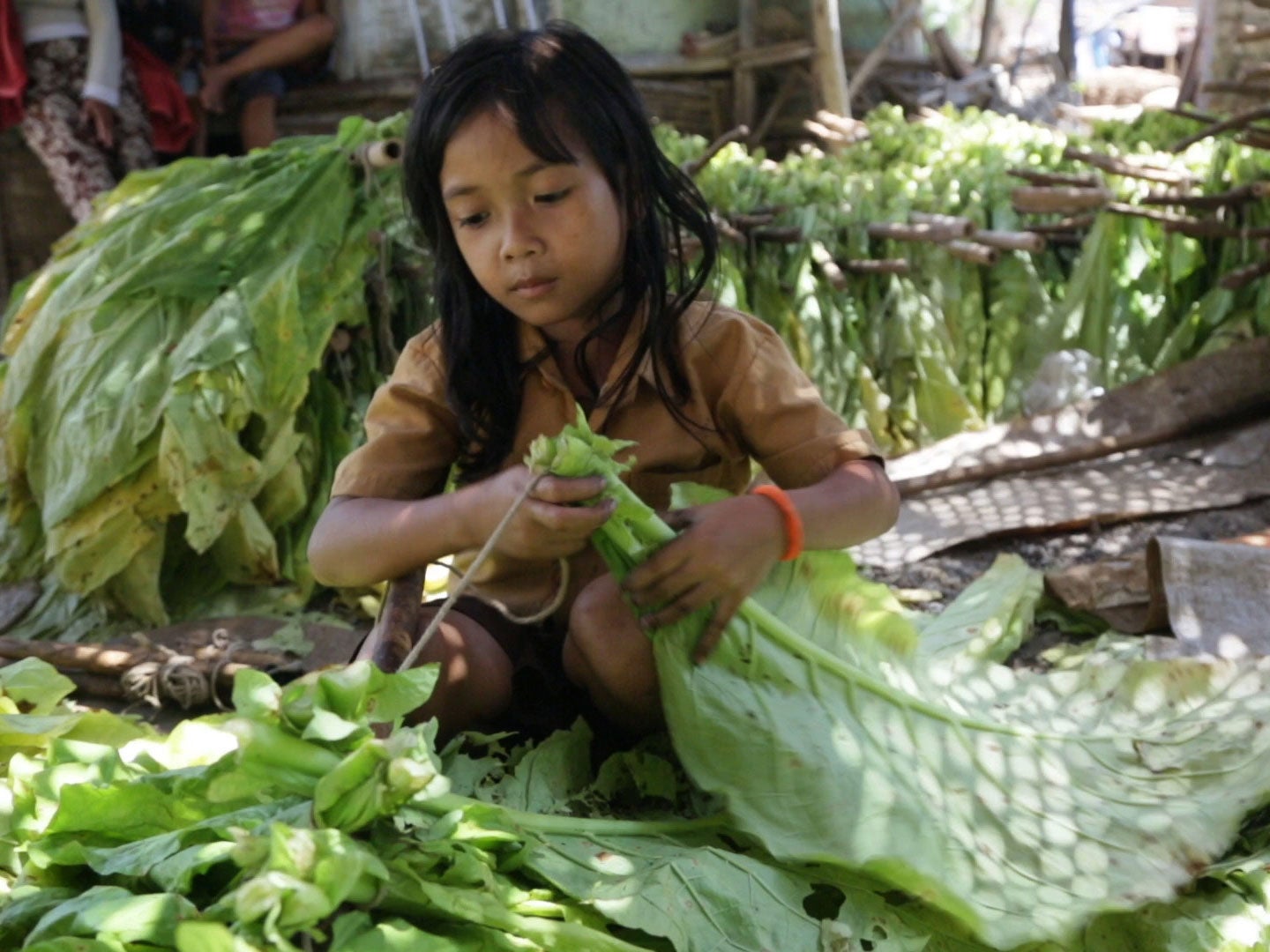Children should not be suffering on tobacco farms in the 21st century
At the International Labour Conference in Geneva, governments, trade unions, and employers will open talks on how to prevent abuse in global supply chains to protect the health of child workers

Your support helps us to tell the story
From reproductive rights to climate change to Big Tech, The Independent is on the ground when the story is developing. Whether it's investigating the financials of Elon Musk's pro-Trump PAC or producing our latest documentary, 'The A Word', which shines a light on the American women fighting for reproductive rights, we know how important it is to parse out the facts from the messaging.
At such a critical moment in US history, we need reporters on the ground. Your donation allows us to keep sending journalists to speak to both sides of the story.
The Independent is trusted by Americans across the entire political spectrum. And unlike many other quality news outlets, we choose not to lock Americans out of our reporting and analysis with paywalls. We believe quality journalism should be available to everyone, paid for by those who can afford it.
Your support makes all the difference.Ayu is only 13 years old, but has already worked for several seasons on her family’s tobacco farm in West Java, Indonesia. Every year, she says she gets sick while carrying tobacco leaves during harvest time. “My stomach is like, I can’t explain, it’s stinky in my mouth. I threw up so many times….”
Thousands of children work on Indonesia’s 500,000 tobacco farms. Many, like Ayu, get sick in the process. Human Rights Watch interviewed more than 100 child tobacco farmers, half of whom reported nausea, vomiting, headaches, or dizziness —symptoms consistent with acute nicotine poisoning, which happens when nicotine from tobacco plants is absorbed through the skin.
Ayu’s father sells his crop to a local village leader, who sells it on to a tobacco trader in Central Java. That trader sells it on the open market to tobacco companies from around the world, including two British firms, British American Tobacco and Imperial Tobacco. An opaque supply chain means neither company knows if Indonesian children helped farm the tobacco they buy, much less if they fell sick for their troubles. Smokers buying a pack of Dunhills or Lucky Strikes likely light up in ignorance too.
Around the world some 450 million people work in global supply chains. They include factory workers making clothes for big brand names, small-scale miners digging gold for jewellery and watches, and farmworkers growing tobacco and other crops. These chains are often complex, and span multiple countries with radically different legal and regulatory standards. Good practice in one area is no guarantee that the other end of the supply chain is not tainted by child labour or miserable working conditions.
A big part of the problem is that the international standards that guide companies on good practice are voluntary. Some companies take them seriously, and actively try to prevent human rights abuses in their supply chains and address abuses that occur. Some make good faith efforts but fail, lacking concrete guidance on how to fix problems. Other firms simply ignore them.
A combination of poor government regulation and feeble due diligence by companies can have catastrophic results. Take the 2013 Rana Plaza disaster in Bangladesh, when over 1,100 workers died and scores more were injured when their 8-story factory building collapsed. Most international brands operating there had shown no interest in structural concerns raised – until it was too late.
Human rights abuses can be found in many industries, and persist in wealthy and poor countries alike. In Ghana, children risk death as they climb deep into unstable pits to mine gold, while teenagers in Bangladesh risk poisoning and horrific industrial accidents in the country’s lucrative tannery industry.
The current laissez fair system—where companies are too often expected to regulate themselves—just isn’t working. But that can change. This week at the International Labour Conference in Geneva, governments, trade unions, and employers will open talks on how to prevent abuse in global supply chains.
Delegates should start by negotiating a new, legally-binding international standard, setting out mandatory due diligence measures on human rights. Governments would then require companies based in their territory to adopt these measures throughout their supply chains – even when they operate in other countries.
Some companies, of course, will resist any new regulations, no matter how measured, viewing them as too onerous or “anti-business.” But mandatory rules would put all businesses on a level playing field and avoid the “race to the bottom”, where companies try to gain a competitive advantage by exploiting weak labour laws and lax enforcement present in some countries.
Some examples of how this might work already exist. The UK’s new Modern Slavery Act obliges companies to report annually on steps taken to ensure neither slavery nor human trafficking exist in their operations or supply chains. In the US, the Dodd Frank Act requires companies to ensure minerals they mine do not fuel armed conflict in the Democratic Republic of Congo. And in Brazil, a strict government ban on child labour in tobacco farming is working – mainly because its penalties apply not only to farmers, but also to the companies buying the tobacco.
Delegates in Geneva should seize the chance to fix a broken system, because if Brazil’s children no longer have to get sick toiling in tobacco fields, neither should Indonesia’s.
Jo Becker is the children’s rights advocacy director for Human Rights Watch
Join our commenting forum
Join thought-provoking conversations, follow other Independent readers and see their replies
Comments